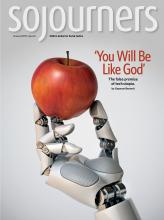POWERFUL CLAIMS IN SCRIPTURE about the gospel are clothed in thought forms so archaic that most preachers shy away from them. The letter to the Ephesians has much to teach us this month, but what are we to make of the claim that we are called to ensure that “through the church the wisdom of God in its rich variety might now be made known to the rulers and authorities in the heavenly places” (3:10)?
We moderns assume that evangelism targets human individuals, but the New Testament writers insist that the revolutionary message is addressed to cosmic forces that exert control over our culture and our political institutions, giving them notice that God’s saving intervention in Christ is more than a match for their malign influence. These are the “rulers and authorities” that the writer to the Colossians insists were disarmed by Christ’s death on the cross, where he “made a public example of them, triumphing over them in it” (2:15). Let us do the hard work of translating these claims into terms that can apply to our own work of evangelism. We may no longer believe in actual heavenly entities that need to be deposed by the good news, but we must bring the gospel to bear on our contemporary equivalents. Don’t we talk glibly about “the markets”—as if they were an impersonal force we can do nothing about? But the gospel debunks this evasion of responsibility about how human beings distribute the good things of the earth.
Read the Full Article

